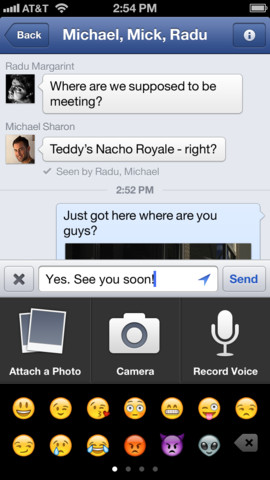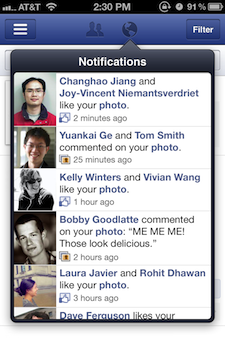Yandex,
the Google of Russia, has built a voice-activated visual search engine
for Facebook. Codenamed “Wonder,” the mobile app lets people ask what
businesses friends have visited and what content they’ve consumed,
sources confirm. The question is if Facebook will permit the app. Its
policy prohibits use of its data in search engines without permission,
and Wonder resembles Facebook “Nearby.”
I talked to multiple industry sources who’ve seen Wonder first-hand
or currently have a build of it on their iOS device (though an Android
version may have been developed, too). The logo you see above is my
attempt at an artist rendition of what sources say an early version of
the app’s logo looked like. One source said Wonder is “about more than
Facebook” which means it could pull in more traditional search results,
or just make use of data from the partners I detail below.
A Yandex spokesperson said Yandex “can’t confirm and can’t comment”
on Wonder. However, they did admit that “Yandex is working on mining
social data. We are building social products.” It also noted it would
have an announcement to make on that front in the coming weeks or
months, which could certainly be a reveal of Wonder.
Here’s a rundown of how an alpha version of Wonder worked, but note
that some design and partnership details may change if it’s released.
Welcome To Wonder
Wonder users can search using voice for things such as “restaurants
in Los Angeles my friends have visited.” A horizontal, tile-by-tile
scrolling interface lets them view one at a time the restaurants where
their Facebook friends have taken photos or checked in. Wonderers can
also type to search instead of using voice, or ask to see where a
specific friend has gone.
Clicking on a business shows a horizontal stream of photos and
recommendations of that place posted by their friends. Another tap
brings up Foursquare-powered venue info such as a map, address, and
phone number.
Wonder isn’t just for local businesses like Facebook’s
recently launched “Nearby” feature built by the
acquired Gowalla team.
Wonder can pull up music that friends have listened to, let you learn
about artists thanks to Last.fm-powered profiles, or preview or buy
songs from iTunes. There’s a news discovery component, too. You can see
news articles recently read by all your friends or a specific friend and
read them within the app through an internal browser.
Yandex’s Passport To The USA

Yandex
has largely limited itself to Russia and Russian-speaking markets over
the years — a market where it is currently the largest search provider.
But its share in its home market has come down and been hovering around
60 percent in the last year with competition from Google and others, so
it is turning to growth elsewhere.
Just as Google has extended into mobile to expand the potential footprint for its advertising network, Yandex has done the same.
Chief among those efforts have been Yandex’s moves in mobile. A little over a year ago, it bought a company called
SPB Software, which develops cross-platform mobile applications and user interfaces.
Some of projects SPB may have helped Yandex with include apps discovery for
music,
business listings, taxi services (similar to Uber, with a very popular app in Moscow) and more (this
Google Play list
includes apps for movie listings, ecommerce, Yandex’s Dropbox-like app
Yandex.disc, and Yandex.market for ‘personal shopping’ ). In fact, you
could think of these as a composite for some of the features of Wonder.
Perhaps most important of all, are
Yandex’s location-based and mapping efforts. Yandex’s maps have replaced Google on iOS devices in Russia, and it also provides the
search (but not native maps) on Windows Phone devices in the country. These location-based services might just be Yandex’s
passport out of Russia (or so it hopes).
Yandex’s Dream, Facebook’s Nightmare?
So Wonder sounds great, especially compared to Facebook’s internal
search engine, which is glaringly deficient. There’s no way to search
for news read by friends, searching an artist’s name in the music
category returns zero results, and if you figure out how to use the
Places tab to search for restaurants, you’re met with standard-looking
search results. Finding photos or recommendations of businesses from
your friends is tough.

Facebook tried to
fix some of this with Nearby,
and did a pretty good job with the business search. Built into a tab in
Facebook’s primary mobile apps, Nearby shows you places friends have
been, Liked, or recommended. It took a browse-by-category approach to
minimizing mobile typing, in contrast to Wonder’s focus on voice
commands. However, Nearby doesn’t surface photos taken by friends at
places yet, and it might be better off as a standalone app rather than
being buried in Facebook for iOS and Android’s navigation.
The problem is that Yandex’s Wonder may be a bit too great and employ too much of Facebook’s data. In May, Facebook updated its
Platform Policies
to include the statement “You must not include data obtained from us in
any search engine or directory without our written permission.”
Facebook tells me this was designed to keep your friends from
volunteering your private information to public search engines. But
Wonder could definitely be interpreted as a search engine, especially
considering its built by Yandex, and the policy doesn’t only apply to
private data.

In
fact, Facebook apparently learned that Yandex was developing Wonder
around the time it changed its policy, and the line could have been
added to protect Facebook’s future endeavors in search from invaders
like Yandex. Therefore, Wonder might get its public Facebook data access
shut down if it doesn’t have permission, and I’ve heard Yandex is
actually worried this will happen pre- or post-launch.
CEO Mark Zuckerberg himself
explained at TechCrunch Disrupt SF that Facebook is getting into search:
“Search is interesting. I think search engines are really evolving
to give you a set of answers…’I have this specific question, answer
this question for me’. Facebook is pretty uniquely positioned to answer
the questions people have. ‘What sushi restaurants have my friends gone
to in New York in the last six months and Liked?’ These are questions
that you could potentially do at Facebook if we built out this system
that you couldn’t do anywhere else. And at some point we’ll do it. We
have a team working on search.”
Facebook Nearby, since it launched, could answer that sushi question,
but so could Wonder thanks to Facebook’s data. With local business
discovery comes lots of opportunity for monetization through sponsored
placement and other channels. Facebook may not want some other company
cashing in on this.
There is hope, though. Facebook struck a
status update licensing deal with Yandex in 2010
to allow public posts from Pages to appear in the Russian search
engine. In exchange Facebook got a widget on the Yandex home page that
helped it sign up Russian users when it was still fighting off local
social network VKontakte. Russian news outlet R
ia Novosti also reported that Zuckerberg visited Yandex’s headquarters in Moscow in the Fall and held talks with management there.
Perhaps Facebook and Yandex could come to some sort of partnership
around Wonder, such as a revenue share or allowing it to use Facebook
data in exchange for more promotion of Facebook on Yandex. Other
possibilities include Facebook buying the app from Yandex, cloning it
the way Facebook copied Snapchat to build Poke, or working out a larger
deal where Yandex assists Facebook with its search strategy. If Facebook
was really feeling generous, it could just give Yandex permission to
use the necessary data in Wonder.
No matter the outcome, sources say Yandex has proven there’s wondrous potential for Facebook in mobile search.
[Additional reporting by Ingrid Lunden]
September 23, 1997
NASDAQ:YNDX
Yandex is an internet technologies company that operates in
Russia, CIS and Turkey. It is the largest Russian and fifth-largest
world internet search engine. Yandex is an acronym for the phrase Yet
Another Indexer.
As of December 2011, Yandex had 60.9% of the Russian search market
(source: LiveInternet.ru).
Yandex™s mission is to give the answer to the user anytime and anywhere.
Company provides its services for desktop and mobile users and develops
embedded solutions as well.
The company specializes on highly-targeted sophisticated...
Credit :
Tech Crunch





 Yandex
has largely limited itself to Russia and Russian-speaking markets over
the years — a market where it is currently the largest search provider.
But its share in its home market has come down and been hovering around
60 percent in the last year with competition from Google and others, so
it is turning to growth elsewhere.
Yandex
has largely limited itself to Russia and Russian-speaking markets over
the years — a market where it is currently the largest search provider.
But its share in its home market has come down and been hovering around
60 percent in the last year with competition from Google and others, so
it is turning to growth elsewhere.
 In
fact, Facebook apparently learned that Yandex was developing Wonder
around the time it changed its policy, and the line could have been
added to protect Facebook’s future endeavors in search from invaders
like Yandex. Therefore, Wonder might get its public Facebook data access
shut down if it doesn’t have permission, and I’ve heard Yandex is
actually worried this will happen pre- or post-launch.
In
fact, Facebook apparently learned that Yandex was developing Wonder
around the time it changed its policy, and the line could have been
added to protect Facebook’s future endeavors in search from invaders
like Yandex. Therefore, Wonder might get its public Facebook data access
shut down if it doesn’t have permission, and I’ve heard Yandex is
actually worried this will happen pre- or post-launch.



























![[faceshare0522]](http://si.wsj.net/public/resources/images/OB-TB050_facesh_D_20120522101907.jpg)













